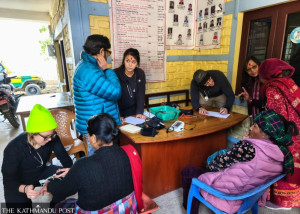Health
More children in Madhesh and Karnali infected with soil-transmitted intestinal worms: Report
A study shows prevalence of soil-transmitted intestinal worms in seven percent of children between five and 10 years.
Post Report
Fifteen to 20 percent of the children between five and 10 years of age from Madhesh and Karnali provinces have been found infected with soil-transmitted intestinal worms, a new report shows.
According to a study carried out with financial and technical assistance from the World Health Organisation in April this year, the two provinces have the highest prevalence of soil-transmitted worms, officials say.
“Children from other provinces have also been found infected with the soil-transmitted intestinal worms,” said Lila Bikram Thapa, chief of the Nutrition Section at the Family Welfare Division under the Department of Health Services. “But problems in other provinces are not so severe compared to Karnali and Madhesh provinces.”
Soil-transmitted helminth infections, or intestinal parasites, are the most common infections worldwide, from which poor and most vulnerable populations get affected the most. Ascaris lumbricoides, trichuris trichiura and hookworms are the causative agents of the disease, according to the WHO. The diseases are transmitted by consuming contaminated water, uncooked foods and unwashed or unpeeled fruits and vegetables.
Adult worms live in the intestine, where they produce thousands of eggs every day. In areas that lack adequate sanitation, these eggs contaminate the soil.
Doctors say infected children are nutritionally and physically impaired. Girls and women of reproductive age suffer from anaemia, and blood loss is exacerbated if infected with intestinal worms, which ultimately increases the risk of maternal and infant mortality and low birth weight.
Officials said that the study was carried out in 19 districts of all seven provinces, which include districts of all three mountain, hill and Tarai regions. Stool samples were collected from 3,000 grade 3 students across over 90 schools, both public and private.
Health officials say that more children have been found infected with roundworms. Some have been found infected with Hymenolepis nana, a kind of intestinal worm. It is more common in children living in poverty and with poor hygiene.
Doctors say the risk of transmission of the worms is high in areas where water and sanitation conditions are compromised, people are less aware of hygiene practices and hand washing. Also, those who consume raw vegetables and fruits without washing them properly are at risk of getting infected with intestinal worms.
“The report of the study shows that water and sanitation conditions are not much improved in districts of Madhesh and Karnali provinces,” said Thapa. “Concerned authorities still have to do much for the improvement of water and sanitation conditions. Children are not washing their hands before eating, so awareness should be launched for behaviour change.”
The government has been launching a nationwide deworming campaign twice a year for children under five years of age. People above five years of age generally do not take medicines unless prescribed by physicians.
Officials say that the deworming campaign can be stopped or launched only once a year where reports show no serious problems and continue twice in the areas where serious issues are seen.
The UN health body has recommended periodic medical treatment, deworming, health and hygiene education and healthy behaviours.




 10.12°C Kathmandu
10.12°C Kathmandu













